英语中的疑问句
英语中一般疑问句
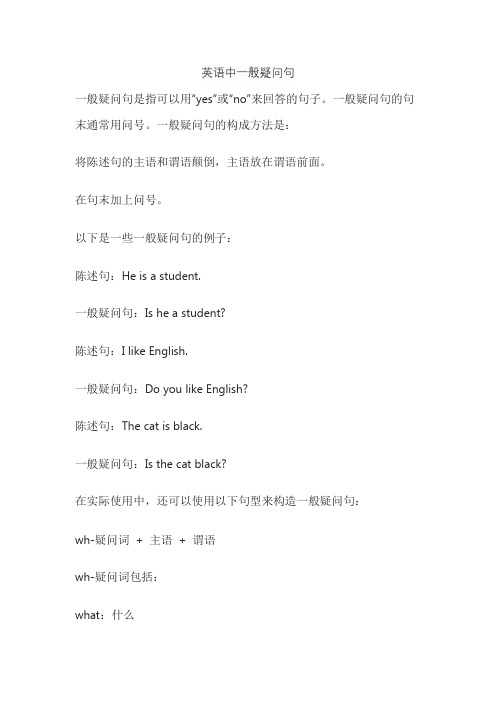
英语中一般疑问句
一般疑问句是指可以用“yes”或“no”来回答的句子。
一般疑问句的句末通常用问号。
一般疑问句的构成方法是:
将陈述句的主语和谓语颠倒,主语放在谓语前面。
在句末加上问号。
以下是一些一般疑问句的例子:
陈述句:He is a student.
一般疑问句:Is he a student?
陈述句:I like English.
一般疑问句:Do you like English?
陈述句:The cat is black.
一般疑问句:Is the cat black?
在实际使用中,还可以使用以下句型来构造一般疑问句:
wh-疑问词+ 主语+ 谓语
wh-疑问词包括:
what:什么
who:谁
where:在哪里
when:什么时候
why:为什么
how:如何
以下是一些使用wh-疑问词构造一般疑问句的例子:陈述句:The book is on the table.
一般疑问句:What is on the table?
陈述句:The man is my father.
一般疑问句:Who is your father?
陈述句:I went to the park yesterday.
一般疑问句:When did you go to the park?
陈述句:I like to eat apples.
一般疑问句:Why do you like to eat apples?
陈述句:I can run very fast.
一般疑问句:How fast can you run?。
英语中的疑问句和特殊疑问句
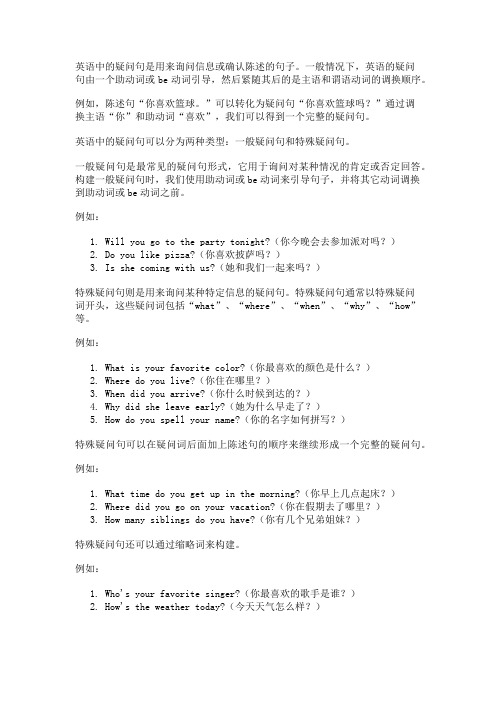
英语中的疑问句是用来询问信息或确认陈述的句子。
一般情况下,英语的疑问句由一个助动词或be动词引导,然后紧随其后的是主语和谓语动词的调换顺序。
例如,陈述句“你喜欢篮球。
”可以转化为疑问句“你喜欢篮球吗?”通过调换主语“你”和助动词“喜欢”,我们可以得到一个完整的疑问句。
英语中的疑问句可以分为两种类型:一般疑问句和特殊疑问句。
一般疑问句是最常见的疑问句形式,它用于询问对某种情况的肯定或否定回答。
构建一般疑问句时,我们使用助动词或be动词来引导句子,并将其它动词调换到助动词或be动词之前。
例如:1.Will you go to the party tonight?(你今晚会去参加派对吗?)2.Do you like pizza?(你喜欢披萨吗?)3.Is she coming with us?(她和我们一起来吗?)特殊疑问句则是用来询问某种特定信息的疑问句。
特殊疑问句通常以特殊疑问词开头,这些疑问词包括“what”、“where”、“when”、“why”、“how”等。
例如:1.What is your favorite color?(你最喜欢的颜色是什么?)2.Where do you live?(你住在哪里?)3.When did you arrive?(你什么时候到达的?)4.Why did she leave early?(她为什么早走了?)5.How do you spell your name?(你的名字如何拼写?)特殊疑问句可以在疑问词后面加上陈述句的顺序来继续形成一个完整的疑问句。
例如:1.What time do you get up in the morning?(你早上几点起床?)2.Where did you go on your vacation?(你在假期去了哪里?)3.How many siblings do you have?(你有几个兄弟姐妹?)特殊疑问句还可以通过缩略词来构建。
英语中一般疑问句和特殊疑问句的区别

英语中一般疑问句和特殊疑问句的区别一般疑问句和特殊疑问句是英语语法中两种不同类型的问句。
一般疑问句是用于向对方询问某个陈述句是否属实,通常需要以助动词或be动词开头,并使用倒装结构。
例如:
1.You like coffee.(你喜欢咖啡。
)
2.Do you like coffee?(你喜欢咖啡吗?)
在这个例子中,将原陈述句中的"like"动词提取出来,并使用助动词"do"形成疑问句。
特殊疑问句则是用于询问某个特定信息或事实的问句,通常以特殊疑问词开头。
特殊疑问词包括who(谁)、what(什么)、when (何时)、where(哪里)、why(为什么)、how(如何)。
例如:
1.She went to the party.(她去了派对。
)
2.Where did she go?(她去了哪里?)
在这个例子中,特殊疑问词"where"引导了疑问句,并询问了去派对的地点。
总结起来,一般疑问句主要用于确认陈述句的真实性,通常采用助动词或be动词的倒装形式,而特殊疑问句则用于询问特定信息或事实,以特殊疑问词开头。
英语 疑问句 语法结构
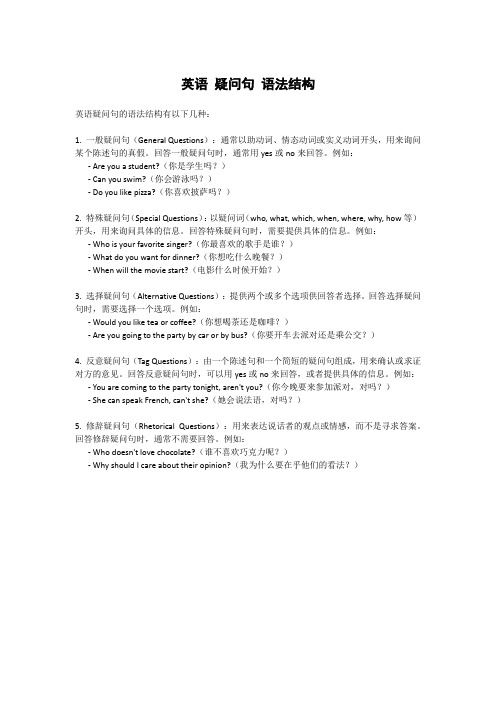
英语疑问句语法结构英语疑问句的语法结构有以下几种:1. 一般疑问句(General Questions):通常以助动词、情态动词或实义动词开头,用来询问某个陈述句的真假。
回答一般疑问句时,通常用yes或no来回答。
例如:- Are you a student?(你是学生吗?)- Can you swim?(你会游泳吗?)- Do you like pizza?(你喜欢披萨吗?)2. 特殊疑问句(Special Questions):以疑问词(who, what, which, when, where, why, how等)开头,用来询问具体的信息。
回答特殊疑问句时,需要提供具体的信息。
例如:- Who is your favorite singer?(你最喜欢的歌手是谁?)- What do you want for dinner?(你想吃什么晚餐?)- When will the movie start?(电影什么时候开始?)3. 选择疑问句(Alternative Questions):提供两个或多个选项供回答者选择。
回答选择疑问句时,需要选择一个选项。
例如:- Would you like tea or coffee?(你想喝茶还是咖啡?)- Are you going to the party by car or by bus?(你要开车去派对还是乘公交?)4. 反意疑问句(Tag Questions):由一个陈述句和一个简短的疑问句组成,用来确认或求证对方的意见。
回答反意疑问句时,可以用yes或no来回答,或者提供具体的信息。
例如:- You are coming to the party tonight, aren't you?(你今晚要来参加派对,对吗?)- She can speak French, can't she?(她会说法语,对吗?)5. 修辞疑问句(Rhetorical Questions):用来表达说话者的观点或情感,而不是寻求答案。
特殊疑问句总结英语
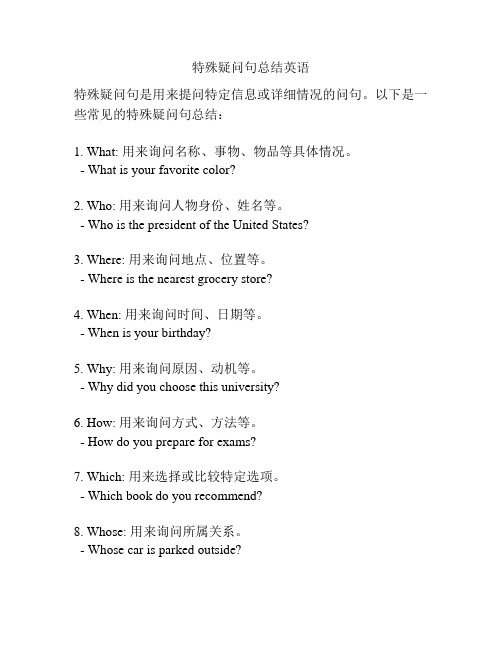
特殊疑问句总结英语特殊疑问句是用来提问特定信息或详细情况的问句。
以下是一些常见的特殊疑问句总结:1. What: 用来询问名称、事物、物品等具体情况。
- What is your favorite color?2. Who: 用来询问人物身份、姓名等。
- Who is the president of the United States?3. Where: 用来询问地点、位置等。
- Where is the nearest grocery store?4. When: 用来询问时间、日期等。
- When is your birthday?5. Why: 用来询问原因、动机等。
- Why did you choose this university?6. How: 用来询问方式、方法等。
- How do you prepare for exams?7. Which: 用来选择或比较特定选项。
- Which book do you recommend?8. Whose: 用来询问所属关系。
- Whose car is parked outside?9. Whom: 用来询问宾语或介词后面的人。
- Whom did you invite to the party?10. How much: 用来询问不可数名词的数量。
- How much does a ticket cost?11. How many: 用来询问可数名词的数量。
- How many siblings do you have?12. How often: 用来询问频率。
- How often do you go to the gym?13. How long: 用来询问时间长度或物体长度。
- How long have you been learning English?14. How far: 用来询问距离。
- How far is it from here to the airport?。
英语语法之疑问句
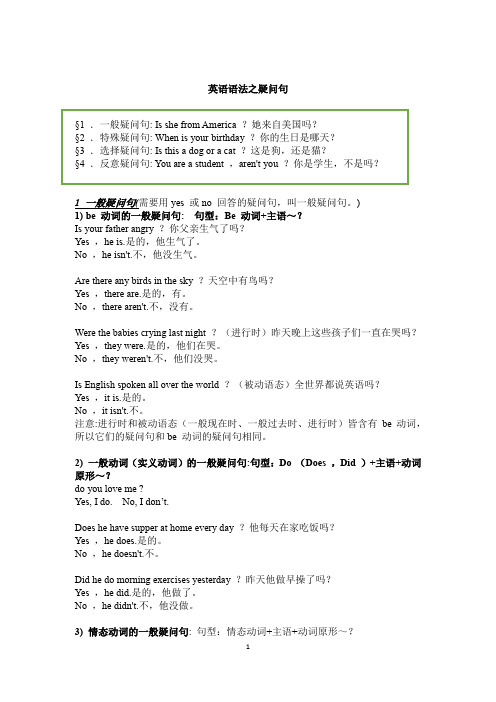
英语语法之疑问句§1 .一般疑问句: Is she from America ?她来自美国吗?§2 .特殊疑问句: When is your birthday ?你的生日是哪天?§3 .选择疑问句: Is this a dog or a cat ?这是狗,还是猫?§4 .反意疑问句: You are a student ,aren't you ?你是学生,不是吗?1 一般疑问句(需要用yes 或no 回答的疑问句,叫一般疑问句。
)1) be 动词的一般疑问句: 句型:Be 动词+主语~?Is your father angry ?你父亲生气了吗?Yes ,he is.是的,他生气了。
No ,he isn't.不,他没生气。
Are there any birds in the sky ?天空中有鸟吗?Yes ,there are.是的,有。
No ,there aren't.不,没有。
Were the babies crying last night ?(进行时)昨天晚上这些孩子们一直在哭吗?Yes ,they were.是的,他们在哭。
No ,they weren't.不,他们没哭。
Is English spoken all over the world ?(被动语态)全世界都说英语吗?Yes ,it is.是的。
No ,it isn't.不。
注意:进行时和被动语态(一般现在时、一般过去时、进行时)皆含有be动词,所以它们的疑问句和be 动词的疑问句相同。
2) 一般动词(实义动词)的一般疑问句:句型:Do (Does ,Did )+主语+动词原形~?do you love me ?Yes, I do. No, I don’t.Does he have supper at home every day ?他每天在家吃饭吗?Yes ,he does.是的。
英语疑问句练习题
英语疑问句练习题1. What time is it?2. Where are you going?3. Who is your favorite teacher?4. How do you spell your name?5. Why did you choose this university?6. When will the concert start?7. How many siblings do you have?8. Can you swim?9. Did you finish your homework?10. Are you feeling okay?11. How far is the nearest bus stop?12. What is the capital of France?13. Why do you want to learn English?14. When is your birthday?15. Where did you go on vacation last summer?16. Who is the president of the United States?17. How often do you exercise?18. Can you play a musical instrument?19. Did you enjoy the movie last night?20. Are you planning to attend the party tomorrow?21. How much does this shirt cost?22. What time does the train leave?23. Why are you late for class?24. When did you start learning piano?25. Where did you buy those shoes?26. Who is your favorite singer?27. How long have you lived in this city?28. Can you speak any other languages?29. Did you watch the news today?30. Are you available for a meeting this afternoon?31. What is your favorite book?32. Why did you choose to study abroad?33. When is the next holiday in your country?34. How often do you go to the gym?35. Where is the nearest post office?36. Who is your best friend?37. How tall are you?38. Can you cook?39. Did you have breakfast this morning?40. Are you interested in attending the conference?41. What is your favorite movie genre?42. Why did you move to a different city?43. When was the last time you went on vacation?44. Where did you learn to speak English so well?45. Who is the CEO of the company?46. How many languages can you speak?47. Can you play tennis?48. Did you pass the exam?49. Are you going to the party tonight?50. What is your favorite type of music?疑问句是英语语法中常用的一种句子结构,用于提问和获取信息。
英语特殊疑问句对动作进行提问
英语特殊疑问句对动作进行提问
在英语中,有一种疑问句叫做特殊疑问句。
这种疑问句是用来询问特定的信息的,例如时间、地点、原因等等。
除此之外,特殊疑问句也可以用来对动作进行提问。
通常情况下,我们可以使用以下几种特殊疑问词来构成特殊疑问句:
1. What:询问一件事情是什么。
例句:What did you do yesterday?
你昨天做了什么?
2. Where:询问一件事情发生在哪里。
例句:Where did you go for vacation?
你去哪里度假了?
3. When:询问一件事情发生的时间。
例句:When did you start learning English?
你什么时候开始学英语的?
4. Why:询问一件事情的原因。
例句:Why did you quit your job?
你为什么辞职了?
5. How:询问一件事情是如何发生的。
例句:How did you get here?
你是怎么来到这里的?
使用这些特殊疑问词,我们可以轻松地对动作进行提问,并了解更多相关信息。
初中英语疑问句知识点
初中英语中,疑问句是一个重要的语法知识点。
以下是一些常见的初中英语疑问句的知识点:1. 一般疑问句:一般疑问句以助动词(be动词、do/does/did)或情态动词(can/could、will/would、shall/should、may/might、must等)开头。
例如:“Are you a student?”,“Can you swim?”。
2. 特殊疑问句:特殊疑问句用来询问特定的信息。
常见的特殊疑问词包括who, what, where, when, why, how等。
例如:“What is your name?”,“Where do you live?”。
3. 选择疑问句:选择疑问句一般用于在给出两个或多个选项时询问对方的选择。
常用的结构是“Do you prefer A or B?”或“Which do you prefer, A or B?”。
例如:“Do you prefer coffee or tea?”,“Which color do you like, blue or green?”。
4. 反意疑问句:反意疑问句通常由一个肯定或否定的陈述句加上一个简略的质疑部分组成。
陈述部分和质疑部分之间在人称、时态、助动词等方面相互呼应。
例如:“You are a student, aren't you?”,“He doesn't like coffee, does he?”。
5. 带有疑问词的特殊疑问句:这种疑问句以特殊疑问词开头,但同时也包含了一般疑问句的结构。
例如:“What time do you usually get up?”,“How often do you exercise?”。
学生在学习疑问句时需要注意以下几点:-疑问句的变换方式,如将陈述句转换为一般疑问句、特殊疑问句等;-特殊疑问词的使用及其不同的含义和用法;-语序的变化,特别是特殊疑问句中主语和谓语的位置变化。
疑问句知识点详解(初中英语专项复习)9
疑问句知识点详解(初中英语专项复习)考向一:一般疑问句英语中的疑问句分为一般疑问句、特殊疑问句、选择疑问句和反意疑问句四种。
所谓一般疑问句,就是可以用yes或no来回答的疑问句。
1. 肯定形式的一般疑问句此类一般疑问句的结构为"连系动词be/助动词/情态动词+ 主语+ 动词原形+ 其他? "。
—Is he a good student? 他是一个好学生吗?—Yes, he is. 是的,他是。
/ No, he isn’t. 不,他不是。
—Does he go to school by bike? 他骑自行车去上学吗?—Yes, he does. 是的,他骑。
/ No, he doesn’t. 不,他不骑。
【典例】—Do you have anything good to suggest?—____________. If I have, I will put it on the QQ message.A. Yes, I haveB. No, I haven’tC. Yes, I doD. No, I don’t【答案】D【解析】句意:——你有什么好的建议吗? ——没有。
如果有的话,我就给你QQ留言。
根据句意可知,用No作否定回答,另外,have是实义动词,回答时要借助于助动词do,即No,I don’t,故选D。
2. 否定形式的一般疑问句此类一般疑问句主要表示反问或惊讶,通常在连系动词be,情态动词或助动词后加not的缩略式n’t,并放在句首。
—Aren’t you a writer? 难道你不是作家吗?—No, I’m not. 是的,我不是。
【注意】在这样的句子中,要注意句子的翻译,yes翻译成"不",no翻译成"是的"。
【典例】—Isn’t he a teacher?—____________. He is a reporter from CCTV.A. No, he isn’tB. Yes, he isC. Yes, he isn’tD. No, he is【答案】A【解析】句意:——他不是一个老师吗?——是的,他不是(老师),他是中央电视台的记者。
- 1、下载文档前请自行甄别文档内容的完整性,平台不提供额外的编辑、内容补充、找答案等附加服务。
- 2、"仅部分预览"的文档,不可在线预览部分如存在完整性等问题,可反馈申请退款(可完整预览的文档不适用该条件!)。
- 3、如文档侵犯您的权益,请联系客服反馈,我们会尽快为您处理(人工客服工作时间:9:00-18:30)。
英语中的疑问句疑问句主要用来提问。
根据其语法结构和交际功能,可以分为以下四种类型:一般疑问句、特殊疑问句、选择疑问句和歧义疑问句。
Are you a fireman? 你是一名消防员吗?(一般疑问句)What do you do at the weekend? 你周末干什么? (特殊疑问句)Would you like to have rice or noodles? 你喜欢吃米饭还是面条? (选择疑问句)He is a Chinese teacher, isn't he? 他是一名汉语老师,不是吗?(反意疑问句)一、一般疑问句(yes-no question)一般疑问句通常用来询问一件事情或一种情况是否属实,其回答通常是 yes 或 no,因此这类问句又叫做“是非问句”1、肯定提问Is there something wrong with this machine? 这台机器有问题吗Have you got today's milk? 你拿到今天的牛奶了吗Shall we go on? 我们继续向前吗Must I finish my work on time? 我必须按时完成我的工作吗Can you speak French? 你会说法语吗Would you like me to interpret for you? 要不要我帮你翻译Do you have a smaller size? 你有小一点的尺寸吗Does Susan speak English? 苏珊讲英语吗Did you mom go shopping last weekend? 你妈妈上个周末去买东西了吗2、否定提问Will he not agree with you? 他不同意你吗Haven't you any sisters? 你没有姐妹吗Don't you like this movie? 你不喜欢这部电影吗Can't we go together? 我们不能一起去吗Won't you sit down? 你不想坐下吗Hasn't she been up to the mark lately? 最近她一直感到不太舒服吗3、回答Will you agree with us to e here? 你同意我们来这里吗Yes, we will. 是的,我们会 | No, we won't. 不,我们不会Have got today's newspaper? 你有今天的报纸吗Yes, I have. 是的,有 | No, I haven't. 不,没有Can't he afford a new house? 他买不起新房吗Yes, he can. 不,他能 | No, he can't. 是的,他不能二、特殊疑问句(special question)特殊疑问句是对句中的某一部分提出疑问,通常以 who、where、when、why等疑问词开头,因此又叫“wh-问句”1、疑问代词疑问代词:who、whom、whose、which、whatWho are you? 你是谁Whom are you going to play table tennis this afternoon? 今天下午你和谁打乒乓球Whose glasses are broken? 谁的眼镜打碎了Which shoes do you like? 你喜欢哪双鞋子What do they want to do? 他们想要做什么2、疑问副词疑问副词:when、where、why、howWhen does she want to practice? 她想要什么时候练习Where is the restroom? 洗手间在哪里Why did you leave? 你为什么离开了How do you study English? 你怎么学习英语3、how 构成的短语how 构成的短语:how about = what about 怎么样、how many times 多少次、how do you say... 你怎么说、how are you 普通问好、how many/much 多少、how old 多大年纪、how far 多远、how often 多久一次、 how long 多久、how soon 多久以后等How about bringing some ice cream? 带一些冰激凌怎么样How do you say this word in English? 你怎么用英语说这个单词Howare you? how are you 只是普通问好的方式。
他们不需要你给出一个详细答案。
普通人只会回答 I'm fineHow many bananas are in the basket? 这个篮子里有多少香蕉How much water does the jug hold? 这个罐子能装多少水How many times have you tested this? 你们测试了多少次How old are you? 你多大了(英语中没有虚岁一说)How far can you throw? 你能扔多远How often do you visit your grandmother? 你多久去拜访你的奶奶How long are you staying in Britain? 你在英国待了多久了How soon can you deliver some more? 你多久能再送来一些三、选择疑问句(alternative question)选择疑问句是对问题提出两个或两个以上的答案供对方选择的疑问方式1、以一般疑问句为基础Shall we go by bus or by train? 我们乘汽车还是乘火车?Shall I give you a hand, or you can manage? 要我帮你,还是你自己解决?2、以特殊疑问句为基础Which do you prefer, coffee or tea? 你要哪一样,咖啡还是茶?Coffee or tea? 咖啡还是茶?Which do you like best, singing, dancing or skating? 唱歌、跳舞和溜冰,你最喜欢哪样?四、反意疑问句(tag question)反意疑问句又称为附加疑问句,英语称为 tag question,是一种常用于口语的疑问句式,主要由“陈述句(或祈使句) + 疑问句”构成,疑问句部分的动词要与陈述句部分的动词相对应,疑问句中的主语要与陈述句中的主语相对应,如果陈述部分的主语是名词词组,则疑问句部分用相应的代词表示1、祈使句祈使句出现时,恒以 will you 形成反问;以 let's 起首的祈使句出现时,恒以 shall we 形成反问Study hard, will you?要用功,好不好?Don't do it, will you? 不要做这件事,好不好?Let me go, will you? 让我走,好不好?Let's stop here, shall we? 我们在这里停下,好吗?Let's do it, shall we? 咱们做这件事吧,好不好?2、陈述句陈述句有 be 动词时,以该 be 动词形成反问;陈述句有助动词(will、shall、can、have...)时,以该助动词形成反问;陈述句只有动词时,按主语人称及该动词时态,置 do、does、did 形成反问(1) 前肯后否There is wifi at this cafe, isn't there? 在这个咖啡厅有无线网络,对吗?The clock is slow, isn't it? 表走得慢,对吗?Your are good at math, aren't you? 你擅长数学,对吗?John is going to study English, isn't he? John 会学习英文,对吗?陈述句含有 would rather(宁愿)、ought to(应当)、had better(最好) 等短语助动词时,以第一个词形成反问You would rather stay here, wouldn't you? 你宁愿待在这里,不是吗?He had better not do it, had he? 他最好不要做这件事,不是吗?(2) 前否后肯She can't play the violin, can she? 她不能拉小提琴,对吗?陈述句含有 scarcely、hardly、rarely、no doubt、little、never、by no means 等否定副词或短语时,该陈述句为否定句,须接肯定反问He can hardly sing, can he? 他几乎不会唱歌,不是吗?He is by no means nice, is he? 他绝不是个好人,不是吗?Your parents seldom beat you, did they? 你父母很少打你,对吗?Nobody wants to go there, does he? 没人想去那里,对吗?Neither you nor I am good at English, are we? 你和我都不擅长英语,对吗?(3) 反问部分恒用代词John looks handsome, doesn't he?That is good, isn't it?These will do, won't they? 这些就可以了,不是吗There 起首的陈述句中,由于 There 是副词而非代词,故仍应使用 there 而非 it 形成反问There is a man there, isn't there? 那里有个人,不是吗There have been so many problems recently, haven't there? 最近问题很多,不是吗(4) need 和 dare 反问部分用 doHe needed to go, didn't he?He doesn't need our help, does he?He need not go, need he? = He doesn't need to go, does he?He dares to do it, doesn't he?He didn't dare to do it, did he?He dare not do it, dare he? = He doesn't dare to do it, does he?(5) 主语表示意见接 that 从句a、陈述句中第一个人称单数主语 I 表示意见或观点而接that 从句时,以 that 从句形成反问I think that he is nice, isn't he?I don't think that he can do it, can he?b、但主语若为 I 以外的主语,则应按句首形成反问We think that he is nice, don't we?It is his belief that Peter will e, isn't it?3、回答无论哪种形式的反意疑问句,回答时要遵循“Yes +肯定式” 或者“No + 否定式”Tom borrowed your pen yesterday, didn't he? 汤姆昨天借了你的钢笔,是吗?Yes, he did. 是的,他借了 | No, he didn't. 不,他没错The man never came here, did he? 这人从来不来这里,是吗?Yes, he did. 不,他来的 | No, he didn't. 是的,他不来。
